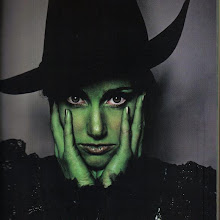Something to be said for Japan's gray zone
Something to be said for Japan's gray zone
By KRIS KOSAKA
Special to The Japan Times
Published on 27 February 2010
It was an a-ha moment, an epiphany light-bolting across her face. It flickered with incredulous certainty and ended with awareness in her eyes.
We were watching Disney's "The Lion King." Scar, the evil brother-lion, mercilessly kills the lion king, gleefully watching him fall to his death during a stampede. I tracked the revelation tracing across her face — I waited, entranced and wondering. What had she realized?
"American bad guys are always bad," my 5-year-old daughter announced. "Japanese bad guys are only sometimes bad." She turned back to the screen and Scar's maniacal laugh.
Since I have seen "The Lion King" 216 times, I mused her divination for the duration of the movie. I knew what she meant — in Japanese animation, particularly our favorites by Hayao Miyazaki, most of the villains wear their evil with ambiguous flair. Think "Spirited Away," where the no-face ghost becomes friends with the main character Sen, or the bad-twin Yubaba shows signs of honor and kindness, while Zenibaba, the good twin, pursues her own justice with diabolical flair.
Disney villains putrefy 100 percent evil, in appearance, actions and voice. All of Miyazaki's films blur the good-evil divide, but even a casual glance at "Pokemon" or "Kamen Rider," two rather frothy kids' TV shows, illustrates the bad guys are not always so bad in Japanese culture.
A friend of mine insists this anti-dualistic perspective results from Japan's lack of a Christian culture, grows from the Shinto belief in many gods. Um. OK. But the tendrils of influence curl over many aspects in society, and there must be other reasons.
Ponder a recent variety show, when a famous celebrity disclosed his secret for subduing thieves: He openly leaves ¥60,000 downstairs, the idea being, the burglars can easily find the cash and leave happily, without disturbing or harming the family. My older Japanese friends did not find this advice surprising at all; indeed, most of them had heard of or tried similar tactics. Beautiful insanity, I thought.
Imagine a typical American reaction to a thief downstairs: frightening gun-supported showdowns, "get-out-of-my-house-scumbag" bluster, or at the minimum, a call to the police. An intruder is "bad" and deserves defeat in the United States, not a hand-out. Most of my friends, and all of my family, keep a weapon in the home for "emergencies," and not one of them lives in Texas. Another kind of insanity, to be sure, but why does Japan so often smudge the good/evil divide?
Typical Japanese sentiment seems to accept the shadier parts of our psyche, reminding me of Jung's many admonishments against suppressing the shadow side. In Japan, we literally thank the shadow for the sun, (O kagesama de), and much of Japanese common sense includes the silences, shady places, spaces most people politely ignore.
Certainly, gray tinges the landscape here partly because of pragmatic necessity. Love hotels, for example, grew out of a need for privacy in small, cramped houses typically sheltering more than one married couple. A small, isolated country cannot pronounce others an "axis of evil." It's not that Japanese sensibility proves more tolerant exactly, only more open about life's gray zones. In Japan, nothing seems as black and white as the inevitability of the shadow.
Something pricks in my memory, and sure enough, I pull from my bookshelf a forgotten copy of Junichiro Tanizaki's "In Praise of Shadows." Written in 1933, the essay illuminates Japanese thought on shadows, discussing everything from toilets to architecture to "curveless" Japanese women to electric light.
Tanizaki does offer a few suggestions for Japan's love of the shadow, but nothing particularly helps me understand some modern Japanese norms: witness the affectionate acceptance showered on Matsui Hideki's openly acknowledged pornography collection. It is hard to imagine a popular American celebrity cheerfully admitting to such a vice.
Or "Yonigeya" ("Flee by Night"), a moving company that specializes in midnight moves — as in avoiding your debtors, abandoning a marriage or business associate. OK, they don't exactly advertise in the yellow pages, but they are accepted enough to be featured in a Japanese drama.
Gray smears even steadfast rules of bureaucracy, and sucking teeth from a government official never means a clear yes or no, only an acknowledgment of inexactitude.
I have to be careful on the train in Japan, glancing down at a stranger's newspaper. I could easily glimpse a nude schoolgirl or other offensive photo, propped open on the lap of an innocent-looking salaryman sitting right in between a dozing grandmother and a pregnant mother. I have learned not to judge this salaryman.
In the West, certain things are labeled "wrong"; in Japan, it's not so clear. Perhaps Japan's wide swath of gray proves more honest and practical than a clear-cut avowal of wrong and right; perhaps the acceptance of so much gray allows blackness to creep into things once pure.
Maybe one thing in Tanizaki's essay does make the shadowed world clearer: He writes, "I suppose I shall sound terribly defensive if I say that Westerners attempt to expose every speck of grime and eradicate it, while we Orientals carefully preserve and even idealize it. Yet for better or for worse we do love things that bear the marks of grime, soot, and weather . . . "
Maybe this love of wabi-sabi extends to people as well; in general, we in the West value perfection and beauty, even in humanity. Japanese sensibility values something else. Right or wrong fades — who can argue a love for beauty, nor dismiss an appreciation for things burnished by time?
The thing about shadows, they disappear when illuminated. No one can ever provide a clear, bright answer. Some things are more interesting when unrevealed, and shadows can both shelter nightmares or dispel the ferocity of the sun.


Ingen kommentarer:
Send en kommentar